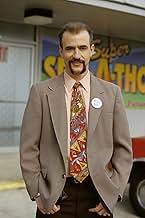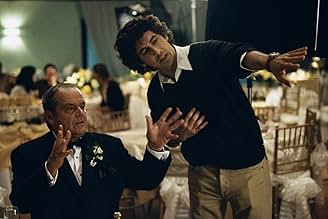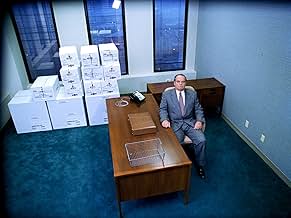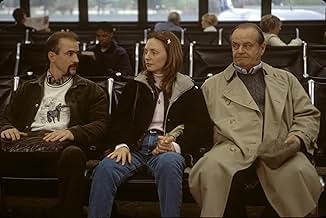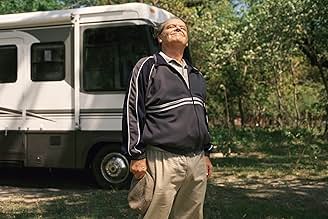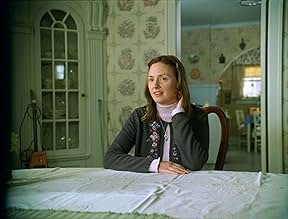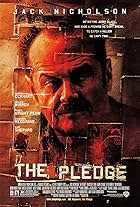Newly retired from the insurance industry, Omaha native Warren Schmidt embarks on an RV journey to his estranged daughter Jeannie's wedding in Denver Colorado, only to discover more about hi... Read allNewly retired from the insurance industry, Omaha native Warren Schmidt embarks on an RV journey to his estranged daughter Jeannie's wedding in Denver Colorado, only to discover more about himself and life than he ever expected.Newly retired from the insurance industry, Omaha native Warren Schmidt embarks on an RV journey to his estranged daughter Jeannie's wedding in Denver Colorado, only to discover more about himself and life than he ever expected.
- Director
- Writers
- Stars
- Nominated for 2 Oscars
- 25 wins & 71 nominations total
- Randall's Best Man
- (as James Micheal Connor)
- Neighbor Lady
- (scenes deleted)
- Director
- Writers
- All cast & crew
- Production, box office & more at IMDbPro
Featured reviews
Conflict can often lead to enlightenment and discovery, but not so in the case of Warren Schmidt. In his case it leads to a life of complacency, denial, delusion, and passive-aggressive behaviors... and eventually, to a meaningless life of servitude devoid of passion or purpose.
Since my wife and I are around the same age as the character, and we ponder the same issues of our lives, the film had more significance to us. I found the work to be a cinema-graphic piece of art laced with symbolism and dark humor (at best). I likened it to previous movies like "Death of a Salesman", "The Apartment", "The Swimmer" (Burt Lancaster), or a short filmed called "The Bridge".
As a cautionary tale (or social comment) on the "American Way" of life, the messages it conveys are slightly exaggerated, but nevertheless there to be debated. We are talking about identity, achievement, interpersonal relationships, and the "average IQ".
In the end, I believe this film will become one that is studied in future classrooms, and it was brave of Nicholson to participate in such a character study and a work intended primarily for writers, actors, and directors. If laughter is "the sound we make when we are surprised (or shocked) by the truth", then the amount of humor you find in this film may be directly related to your own level of naivety or denial. After all, laughter can often be just another defense mechanism, right?
Some movies are straightforward, some are magical, some are mystical, and then, some are symbolic. This movie falls into the last category. The use of time, space, cognitive dissonance, and Irony abound in this work and challenge us to look, think, and feel.
Notes: we would have cut or altered the "Percodan scene" at the rehearsal (as overdone), also note- the cattle at the funeral who later appear on the freeway, inside jokes about Des Moines and Denver, Randall's "Certificate of Attendance", the look on Jeannie's face at the end of Warren's speech at the Wedding Reception, the use of "overstatement", details of wall decorations, and Warren's obvious attraction to the trite, idealistic, delusional, and superficial.
If you are a thinking, feeling, serious movie-lover, you should SEE this film once, and then STUDY it the 2nd time!
In 'Citizen Kane' (1941), the director Orson Welles portrays the same idea when creating Mr. Kane. The movie is more than the story of a tycoon's rise and fall; it is an account of what is ultimately important in a person's life. Even though Kane attains riches and prestige, he is far from happy. He ends with two failed marriages and few friends. At his dying bed, all he has left is his reminiscences - and something called "Rosebud." In 'About Schmidt' the director Alexander Payne uses voiceover to convey Jack's thoughts and memories throughout the movie. To be specific it is when Jack is writing a letter to the boy he sponsors - (Ndugu), at the same time Payne is informing the audience about Jack's regrets and pain concerning his wife and daughter while the movie is still rolling on. I think this is a great technique.I believe this has been a great adventure and wake up call to many Americans as to what is important in life and why we should cherish every moment of it.
Nicholson plays Warren Schmidt, an insurance salesman, whose life crashes down on him when he retires. Nicholson, someone I've loved ever since I first saw him, gives his best performance since "One flew over the cuckoos nest". He's so subtle, so sad, so hollow. You don't doubt for a second that he is Schmidt. He has let his body age for the role, which makes him even more real.
Alexander Payne's direction is flawless. Everyone, simply everyone, does a great job portraying the various characters, from the hotshot newly educated young man who takes Schmidt's job, to the embarrassing buddy of Schmidt's daughter's fiancé.
This is a must-see movie. Even if you hate Jack in all his other movies, you will love him in this one. Don't expect a "hilarious comedy", though. This is a thoughtful movie and not "Anger Management".
10/10
Such a slice of life-American life with it's many warts-warts that the Americans probably don't even recognize: Winnebagos like moving palaces, freeway monuments to genocide, business that consumes it's workers only to dump them unceremoniously, too much of everything that amounts to emptiness, etc., etc. The novel by Begley, upon which the film was based, illustrated this consumer emptiness brilliantly by the inclusion of the bookends to the film, the sponsorship of the Tanzanian child by Schmidt. The child's material emptiness was contrasted with Schmidt's emotional emptiness in a way America does not recognize much less watch on the screen.
The last part of the movie dealing with the marriage of Schmidt's daughter to a man who came from a diametrically opposite "new age" family was an unstated acknowledgment by his daughter that she wanted nothing of her father's values-she wanted a complete break and she was going to marry the break.
A fascinating, complex movie and I'm sorry I didn't see it much earlier.
About Schmidt moves slowly, but it moves with grace. The film's success is deeply in debt to Jack Nicholson, subordinating his personality to the character of Warren Schmidt. It must have been difficult for somebody like Nicholson to display the role's required lack of passion without letting Schmidt lose his human touch. Yet, his portrayal is excellent in its understatement, and his numerable supporting actors do not disappoint either. Fans of Nicholson will be assured in their belief, that their favourite is not only one of the best, but also one of the most versatile actors still working today.
Apart from the acting, director Alexander Payne's film is also well crafted. The somewhat saddened mood is only enhanced by documentary-like shots, constantly making us aware that what we witness is really an everyday-tragedy. The script shows intelligence, and although it contains many subtleties, most of them will not go unnoticed with attentive viewers. Even though About Schmidt is billed as a comedy, it really is a drama. Many of the humorous situations are more tragic than funny, and truly hilarious moments are rare occurrences.
I've often wondered whether the title of About Schmidt has been chosen with any clear intent. The German surname Schmidt equals Smith in English and is one of the most common. So about Schmidt could actually mean "About Everybody". Everybody can wake up one day and discover that everything he or she has devoted himself to, amounts to nothing. It's a frequent social phenomenon, that people suddenly wise up that their lives are almost over, without ever having fully lived them. Maybe that's how all the sea cruises and world tours of old pensioners can be accounted for. Like Schmidt, they are all making a desperate effort to catch up on a time that's long done and over with.
The film does not exactly give answers and, like in reality, does not end with any true revelations to escape all bleakness. But there is something it often likes to apply, namely the self explanatory power of irony. Like one time during the film, when Warren Schmidt decides to adopt a six-year old African foster child by mail. A cheque of twenty-two dollars, which he dutifully provides on a monthly basis, assures that little Ndugu can go to school, gets sheltered, fed and clothed. Yet, in one of his letters Warren writes to him: "What difference has my life made to anyone? None that I can think of. None...at all!"
Well, think again, Mr. Schmidt.
Storyline
Did you know
- TriviaWhen Jack Nicholson received the Golden Globe for Best Actor in a Drama, he commented afterward, "I'm a little surprised. I thought we had made a comedy."
- GoofsAt the wedding, the priest/minister wears the wrong color of vestments: a purple chasuble and blue stole - purple is for Lent and blue is for Advent. The appropriate color for a wedding in terms of church vestments (be it Catholic, Episcopalian or other) is white.
- Quotes
Warren Schmidt: Relatively soon, I will die. Maybe in 20 years, maybe tomorrow, it doesn't matter. Once I am dead and everyone who knew me dies too, it will be as though I never existed. What difference has my life made to anyone. None that I can think of. None at all.
- Crazy creditsThe film title appears above the New Line Cinema Release credit as end credits are done.
- ConnectionsEdited into Nudes in the News: Show #102 (2005)
- SoundtracksYou Sexy Thing
Written by Errol Brown and Tony Wilson
Performed by Hot Chocolate
Courtesy of EMI Records Ltd.
Under license from EMI-Capitol Music Special Markets
- How long is About Schmidt?Powered by Alexa
Details
- Release date
- Country of origin
- Language
- Also known as
- Las confesiones del Sr. Schmidt
- Filming locations
- Messiah Lutheran Church, 5015 S. 80th Street, Omaha, Nebraska, USA(Church where the wedding takes place)
- Production companies
- See more company credits at IMDbPro
Box office
- Budget
- $30,000,000 (estimated)
- Gross US & Canada
- $65,016,287
- Opening weekend US & Canada
- $282,367
- Dec 15, 2002
- Gross worldwide
- $105,834,556
- Runtime2 hours 5 minutes
- Color
- Sound mix
- Aspect ratio
- 1.85 : 1
Contribute to this page



